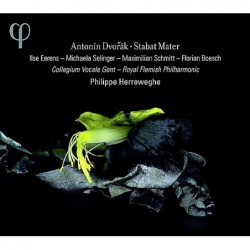




Polityka prywatności

Zasady dostawy

Zasady reklamacji
Muzyka Sakralna
premiera polska: 2013-04-09,
Wydawnicto Audiofilskie
kontynent: Europa
opakowanie: digipackowe etui
opis:
multikulti.com:
Stabat Mater - rozważania o rodzicielskiej tragedii
W 1876 roku, pod wpływem śmierci córki, Antonín Dvořák powrócił do szkiców "Stabat Mater", nadając tej sekwencji, mówiącej o bólu Matki po stracie Syna, bardzo osobisty wyraz.
Dzieło było ukończone, ale nie zinstrumentowane - pracę nad tym, zajęty rozmaitymi obowiązkami kompozytor odłożył do maja 1877. Wtedy raz jeszcze tragedia dotknęła rodzinę Dvořáków: w ciągu trzech tygodni stracili oboje pozostałych dzieci. Praca nad Stabat Mater stała się rodzajem autoterapii dla kompozytora, który ukończył ostatecznie utwór w listopadzie 1877.
Praktycznie natychmiastowy sukces kompozycji sprawił, że Dvořák odtąd zaliczany był do grona czołowych kompozytorów muzyki sakralnej swojej epoki.
"Stabat Mater" nie jest często wykonywany, to utwór trudny zarówno pod względem warsztatowym jak i interpretacyjnym, Philippe Herreweghe i jego Collegium Vocale Gent wraz z Royal Flemish Philharmonic wykonują "Stabat Mater" w bardzo wyważony sposób, nie ma tutaj tak często spotykanego "romantycznego nadmiaru", to raczej duchowa podróż od ponurych otwierających partii po finałowy Amen, podkreślając uniwersalny charakter tego ważnego dzieła muzyki sakralnej.
Editor's info:
Antonín Dvorak’s daughter Josefa died on 21 September 1875. In response to this bereavement, Dvorak composed the initial version of his Stabat Mater – for four soloists, choir, and piano -between 19 February and 7 May 1876. He then set the work aside without orchestrating it. Soon after this, he lost his other two children in the space of a few weeks, his daughter Ružena on 13 August and his son Otokar on 8 September 1877. At this point he returned to the manuscript abandoned the previous year.
The virtually overnight success of his Stabat Mater for soloists, large chorus, and orchestra raised him to the rank of one of the world’s leading composers of sacred music and established him notably in Great Britain, where his reputation was to remain firm for the rest of his life.
This rarely recorded masterpiece has also inspired Philippe Herreweghe and Collegium Vocale Gent. Along with the Royal Flemish Philharmonic, they strip the work of all Romantic excess. The result is a spiritual journey from the sombre opening bars to the final Amen, underlining the universal grandeur of this major work of sacred music.
muzycy:
Collegium Vocale Gent
Royal Flemish Philharmonic
Philippe Herreweghe
utwory:
1. Stabat Mater, Op. 58: I. Stabat Mater dolorosa (Quartet, Chorus), andante con moto 17:06
2. Stabat Mater, Op. 58: II. Quis est homo, qui non fleret (Quartet), andante sostenuto 09:27
3. Stabat Mater, Op. 58: III. Eja, Mater, fons amoris (Chorus), andante con moto 06:29
4. Stabat Mater, Op. 58: IV. Fac, ut ardeat cor meum (Bass Solo, Chorus), largo 07:37
5. Stabat Mater, Op. 58: V. Tui nati vulnerati (Chorus), andante con moto, quasi allegretto 04:45
6. Stabat Mater, Op. 58: VI. Fac me vere tecum flere (Tenor Solo, Chorus), andante con moto 06:04
7. Stabat Mater, Op. 58: VII. Virgo virginum praeclara (Chorus), largo 05:38
8. Stabat Mater, Op. 58: VIII. Fac, ut portem Christi mortem (Duet), larghetto 04:21
9. Stabat Mater, Op. 58: IX. Inflammatus et accensus (Alto Solo), andante maestoso 05:08
10. Stabat Mater, Op. 58: X. Quando corpus morietur (Quartet, Chorus), andante con moto 07:40
wydano: 2013
more info: www.outhere-music.com
more info2: www.collegiumvocale.com
Opis